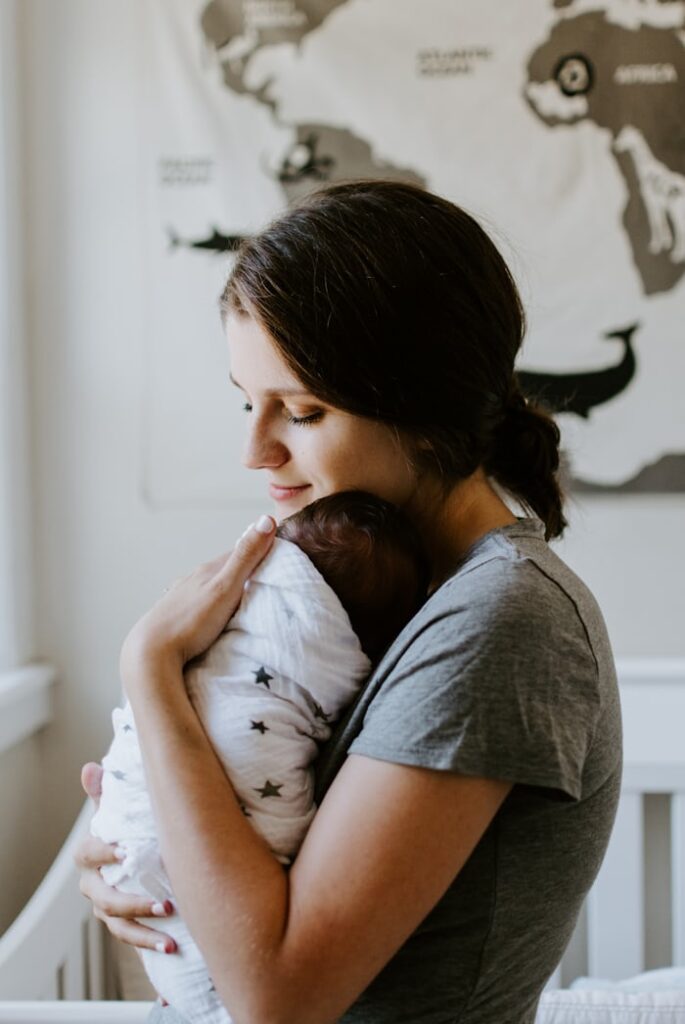Table of Contents
Becoming a parent is a life-changing experience filled with joy, but it can also bring significant stress and challenges. Learning how to deal with stress after having a baby is crucial for both your well-being and your ability to care for your newborn. The postpartum period is a time of immense physical, emotional, and lifestyle changes that can feel overwhelming. This guide aims to provide new parents with practical strategies and insights to navigate this transformative phase, helping you adjust to your new role while taking care of your mental and physical health.

In the following sections, we’ll explore various aspects of postpartum life, from understanding the emotional rollercoaster you might experience to practical tips for regaining your confidence and maintaining your well-being. Whether you’re a first-time parent or adding to your family, these insights will help you navigate the challenges and joys of early parenthood with greater ease and confidence.
Understanding postpartum emotional and physical changes
The postpartum period brings a whirlwind of changes to your body and mind. It’s essential to recognize that these shifts are normal and temporary.
Emotional changes:
- Baby blues: Up to 80% of new mothers experience mood swings, anxiety, and tearfulness in the first two weeks after birth. This is largely due to hormonal fluctuations and typically resolves on its own.
- Postpartum depression: Affecting about 1 in 7 new mothers, this more severe mood disorder can occur anytime in the first year. Symptoms include persistent sadness, loss of interest in activities, and difficulty bonding with the baby.
- Anxiety and intrusive thoughts: Many new parents experience heightened worry or unwanted thoughts about harm coming to the baby.

Physical changes:
- Hormonal shifts: Estrogen and progesterone levels drop dramatically after birth, contributing to mood swings and fatigue.
- Recovery from childbirth: Whether you had a vaginal delivery or C-section, your body needs time to heal. This can involve soreness, bleeding, and fatigue.
- Breast changes: Your breasts may become engorged as milk production begins, which can be uncomfortable.
It’s crucial to remember that healing takes time. Most women start feeling more like themselves within 6-8 weeks, but full recovery can take several months. If you’re concerned about persistent symptoms or feelings, don’t hesitate to reach out to your healthcare provider.
Remember: While these changes are challenging, they’re also a sign that your body is adapting to its new role. Be patient with yourself and seek support when needed.
Navigating the challenges of early parenthood
Learning how to deal with stress after having a baby often involves facing unfamiliar challenges. The first few weeks and months can be particularly demanding as you adjust to your new reality.

- Sleep deprivation: Newborns typically wake every 2-3 hours to feed. This disrupted sleep can significantly impact your mood and ability to cope with stress. To deal with stress after having a baby, try to sleep when your baby sleeps and share nighttime duties with your partner if possible.
- Feeding concerns: Whether you’re breastfeeding or formula-feeding, challenges can arise. Breastfeeding difficulties or worries about your baby’s weight gain are common sources of stress. Consult with a lactation consultant or your pediatrician for guidance.
- Relationship changes: Your relationship with your partner may feel strained as you both adjust to parenthood. Open communication is key when learning how to deal with stress after having a baby. Make time to check in with each other regularly.
- Time management: Balancing baby care with other responsibilities can feel overwhelming. Prioritize essential tasks and don’t be afraid to ask for help.
Remember, the hardest time after having a baby varies for everyone, but many find the first 6-8 weeks particularly challenging as they learn to navigate their new role.
Rebuilding confidence and adjusting to your new life
As you discover how to deal with stress after having a baby, rebuilding your confidence is crucial. Here are some strategies to help:

- Set realistic expectations: Your life has changed significantly, and it’s okay if things aren’t perfect. Be kind to yourself as you adjust.
- Celebrate small victories: Whether it’s successfully soothing your baby or managing to take a shower, acknowledge these accomplishments.
- Connect with other parents: Joining a parent group or connecting with friends who have children can provide valuable support and perspective.
- Maintain your identity: While your role as a parent is important, remember that you’re still you. Try to incorporate activities you enjoyed before having a baby, even if in modified form.
- Practice self-compassion: When learning how to deal with stress after having a baby, remember that everyone makes mistakes. Treat yourself with the same kindness you’d offer a friend.
- Gradual return to routines: As you feel ready, slowly reintroduce elements of your pre-baby life, adapting them to your new circumstances.

Adjusting to life after having a baby is a process. It’s normal to feel overwhelmed at times, but with patience and support, you’ll grow more confident in your parenting abilities. If you’re struggling to cope or experiencing persistent feelings of sadness or anxiety, don’t hesitate to reach out to your healthcare provider. Learning how to deal with stress after having a baby sometimes involves professional support, and that’s completely okay.
Self-care and recovery strategies for new mothers
Learning how to deal with stress after having a baby often involves prioritizing self-care and focusing on recovery. Here are some strategies to help you navigate this challenging period:
1. Physical recovery
- Rest when possible: Sleep when your baby sleeps to catch up on much-needed rest.
- Gentle exercise: Once cleared by your doctor, start with light activities like walking or postpartum yoga to boost mood and energy.
- Nutrition: Eat a balanced diet rich in fruits, vegetables, lean proteins, and whole grains to support healing and energy levels.
- Hydration: Drink plenty of water, especially if you’re breastfeeding.
2. Emotional well-being
- Mindfulness and relaxation: Practice deep breathing or short meditations to manage stress.
- Journaling: Write down your thoughts and feelings to process emotions.
- Limit social media: Comparing yourself to others can increase stress. Focus on your own journey.

3. Social support
- Accept help: Don’t hesitate to accept offers of help from family and friends.
- Join support groups: Connect with other new parents to share experiences and advice.
- Communicate with your partner: Share your feelings and needs openly.
4. Time management
- Prioritize tasks: Focus on what’s essential and let go of perfectionism.
- Create a flexible routine: This can help you feel more in control.
5. Professional support
- Regular check-ups: Attend postpartum check-ups to monitor your physical and emotional health.
- Seek help if needed: Don’t hesitate to contact a healthcare provider if you’re struggling to cope.
Learning how to deal with stress after having a baby is a process. It’s okay to take time for yourself – it’s not selfish, it’s necessary. By taking care of yourself, you’re better equipped to care for your baby. If you’re experiencing persistent feelings of sadness, anxiety, or having trouble bonding with your baby, these could be signs of postpartum depression. This is a common and treatable condition affecting up to 1 in 7 new mothers. Reach out to your healthcare provider if you’re concerned.
Dealing with stress after having a baby is challenging, but with the right strategies and support, you can navigate this new chapter of your life. Remember, every parent’s journey is unique, and it’s okay to find your own path in managing postpartum stress.

Returning to work and exercise: Timing and best practices
Transitioning back to work and reintroducing exercise are important steps in your postpartum journey. Here’s how to approach these changes:
Returning to Work
- Timing: The ideal time varies, but most women return to work between 6 and 12 weeks postpartum. Consider your physical recovery, emotional readiness, and financial needs.
- Gradual return: If possible, start with part-time hours or work from home initially to ease the transition.
- Childcare: Arrange and test your childcare solution before returning to work to reduce anxiety.
- Pumping at work: If breastfeeding, familiarize yourself with your workplace’s policies and facilities for pumping.
- Self-care: Prioritize sleep and maintain healthy habits to manage the added stress of balancing work and parenthood.

Exercise after childbirth:
- Doctor’s approval: Always get clearance from your healthcare provider before starting any exercise routine.
- Timing: Most women can begin light exercises a few days after giving birth, but wait at least 6 weeks for more intense workouts.
- Start slow: Begin with gentle exercises like walking, pelvic floor exercises, and light stretching.
- Listen to your body: Stop if you experience pain, heavy bleeding, or dizziness.
- Gradual progression: Slowly increase intensity and duration as you regain strength and stamina.
- Postpartum-specific exercises: Consider exercises designed for postpartum recovery, which focus on rebuilding core strength and addressing common postpartum issues.
Remember, every woman’s postpartum journey is unique. Be patient with yourself as you navigate these changes. If you’re feeling overwhelmed, don’t hesitate to seek support from your healthcare provider, family, or fellow parents.

